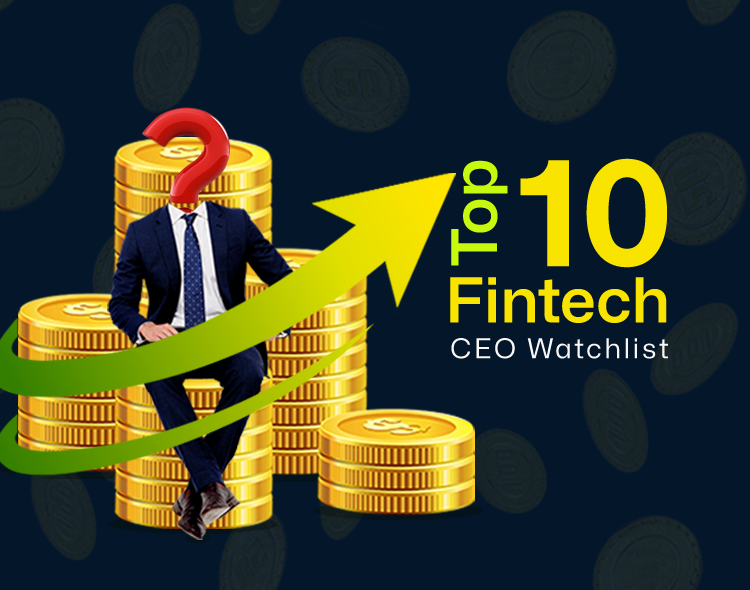The financial technology industry is booming, and undoubtedly it’s led by brilliant people. You can keep up with the newest developments in the fintech industry by analyzing what Fintech leaders are actually doing in their workspace, influencing adoption of new tools and strategies. You will also realize the power of a consolidated enterprise Fintech stack that delivers a much higher ROI to their organizations quickly.
In this article, we bring you the top 10 Fintech leaders that everyone should follow in 2023.
Read the latest article: 10 Best Applications Of AI In Banking
Michael Miebach, CEO, Mastercard
 Mastercard is the world’s number two payment processing company, and Michael Miebach serves as the company’s chief executive officer. He is strengthening cyber services and data-driven insights in his current position, and influencing the future of frictionless commerce. Miebach is in charge of Mastercard’s operations throughout the Middle East and Africa. He joined the company in 2010. He was instrumental in driving the company’s initiatives to expand access to financial services, initially in Africa and then globally. Miebach has worked in high-level positions at financial institutions like Barclays Bank and Citibank.
Mastercard is the world’s number two payment processing company, and Michael Miebach serves as the company’s chief executive officer. He is strengthening cyber services and data-driven insights in his current position, and influencing the future of frictionless commerce. Miebach is in charge of Mastercard’s operations throughout the Middle East and Africa. He joined the company in 2010. He was instrumental in driving the company’s initiatives to expand access to financial services, initially in Africa and then globally. Miebach has worked in high-level positions at financial institutions like Barclays Bank and Citibank.
Miebach is committed to increasing racial fairness in the economy through his work at Mastercard and on the U.S. Treasury Advisory Committee on Racial Fairness. Among his many community involvements, he serves on the International Advisory Panel of the Monetary Authority of Singapore, the International Business Council of the World Economic Forum, and the U.S.-India CEO Forum. He also serves as an at-large board member for the Ronald McDonald House in New York City and on the board of directors for the Metropolitan Opera. Miebach has an MBA from Germany’s University of Passau.
Read: Trust in Banking Explained With 10 Live Examples
Ryan McInerney, Vice Chairman and CEO, Visa

Visa is one of the major digital payment networks in the world, and Ryan McInerney serves as its Chairman and Chief Executive Officer. Founded in 1958, Visa is a global payments network that connects consumers, businesses, banks, and governments in more than 200 nations and territories.
In 2013, McInerney began working for the payments giant. He was the company’s president, in charge of operations around the world, before being promoted to CEO in February 2023. He previously held the position of chief executive officer of consumer banking at JPMorgan Chase, a company with over 75,000 workers and revenues of around $14 billion. McInerney has held the positions of chief operational officer for home lending and chief risk officer for Chase’s consumer businesses previously. He was also in charge of consumer banking products and marketing at Chase. McInerney has worked in retail banking and payments practices as a principal at McKinsey & Company. The extremely successful executive graduated with a degree in finance from Notre Dame.
Dan Schulman, CEO and President, PayPal
 Dan Schulman, CEO of PayPal, is leading a revolution in mobile payment technologies and the financial services industry. Schulman has been in the field for some time and has been with his organization since 2014. Prior to his current role as PayPal’s CEO, he was group president of enterprise growth at American Express, where he oversaw the company’s global strategy to increase its portfolio of alternative mobile and online payment services, forge new alliances, and generate more income.
Dan Schulman, CEO of PayPal, is leading a revolution in mobile payment technologies and the financial services industry. Schulman has been in the field for some time and has been with his organization since 2014. Prior to his current role as PayPal’s CEO, he was group president of enterprise growth at American Express, where he oversaw the company’s global strategy to increase its portfolio of alternative mobile and online payment services, forge new alliances, and generate more income.
After Sprint Nextel Corporation acquired Virgin Mobile USA, where Schulman served as its founding CEO for eight years, he became head of the prepaid segment of Sprint. Schulman has previously served as president and CEO of Priceline Group, guiding the company through a period of tremendous expansion under his leadership. After that, he worked for AT&T for 18 years in various capacities, including president of the Consumer Markets Division.
Read: Unleashing The Power: How Tech Giants Harness Generative AI Chatbots
Schulman is on the boards of the Business Roundtable and the World Economic Forum and is a member of The Economic Club of New York’s board of directors. Schulman has a BA in history from Middlebury College and an MBA in business administration from New York University’s Stern School of Business. He has received honorary degrees from both Rutgers University and Middlebury College for his significant contributions to his field.
Harshil Mathur, Co-Founder and CEO, Razorpay.

CEO of Razorpay and an Indian businessman, author, and entrepreneur Harshil Mathur. His company has reached new heights of success in the financial industry because of his leadership. In India, Razorpay’s product suite is the only option for businesses to accept, process, and disperse payments. You can use it with any major credit card, debit card, net banking, UPI, and a plethora of popular e-wallets.
Mathur went to Seedling Public School beginning in 1997 and finishing in 2009. In 2009, he graduated from college with a bachelor’s degree in mathematics. He subsequently enrolled in the Technology program at the Indian Institute of Technology in Roorkee, where he studied software engineering. He completed his B.Tech degree in 2013. He joined YCombinator in 2015 and was coached by Paul Buchheit and Dalton Caldwell during their time with the W15 Batch.
Chris Britt, CEO & Founder, Chime
 Chime’s CEO and founder, Chris Britt, is at the helm of the company, which he founded with the goal of making financial peace of mind a reality for millions of people. Chime, a rapidly growing financial technology company in the United States, offers convenient banking services at no cost to its users. The group’s core value is based on sharing success with, rather than taking advantage of, its members.
Chime’s CEO and founder, Chris Britt, is at the helm of the company, which he founded with the goal of making financial peace of mind a reality for millions of people. Chime, a rapidly growing financial technology company in the United States, offers convenient banking services at no cost to its users. The group’s core value is based on sharing success with, rather than taking advantage of, its members.
Britt’s resume includes stints as the senior vice president of corporate development at Green Dot Corporation and the senior product leader at Visa before he joined Chime. In addition, he has worked as a management strategy consultant for Accenture in the past. Britt attended Tulane University for his undergraduate degree in economics.
Oliver Yonchev, Co-founder and CEO, Flight Story
 In 2023, the financial technology industry will be preoccupied with issues of regulation, consolidation, clarity, and artificial intelligence. Regulation. After the tale of FTX and the crypto market crisis of ’22, businesses, including crypto and DeFi protocols, will likely undergo significant regulatory changes. Some established DeFi and crypto businesses will have already started down this path, while startups and growing businesses will be obliged to comply or risk collapse. In order to safeguard businesses and the market as a whole, the processes of regulation will expand into a standard of communication and marketing practices for DeFi and crypto assets and services.
In 2023, the financial technology industry will be preoccupied with issues of regulation, consolidation, clarity, and artificial intelligence. Regulation. After the tale of FTX and the crypto market crisis of ’22, businesses, including crypto and DeFi protocols, will likely undergo significant regulatory changes. Some established DeFi and crypto businesses will have already started down this path, while startups and growing businesses will be obliged to comply or risk collapse. In order to safeguard businesses and the market as a whole, the processes of regulation will expand into a standard of communication and marketing practices for DeFi and crypto assets and services.
Read: Most Trending Crypto Wallet Of 2023 – Phantom
Consolidation. Many businesses will likely have a tough time next year as a result of the overall economy. Because of this, consolidation among larger firms is expected to rise. This is in tandem with the efforts of Web2 financial giants like Stripe to enter the Web3 market and provide new services and products, such as cryptocurrencies. To compete in decentralized, saturated markets, businesses like trading platforms and brokerages will expand their platform capabilities by delivering value in the form of new products, analytics, and content that drives the community.
Max Levchin, Founder and CEO, Affirm
 Max Levchin started Affirm with the intention of providing people with trustworthy financial products that would enhance their lives, and today he serves as the company’s CEO. Affirm creates a new payment system that puts people first and encourages responsible spending and saving for millions of individuals. Levchin is not only the Co-Founder and Chairman of Affirm, but he is also the Co-Founder and Chairman of Glow. He also helped found SciFi VC and serves as a general partner there. His innovation lab, HVF, was the starting point for all three businesses.
Max Levchin started Affirm with the intention of providing people with trustworthy financial products that would enhance their lives, and today he serves as the company’s CEO. Affirm creates a new payment system that puts people first and encourages responsible spending and saving for millions of individuals. Levchin is not only the Co-Founder and Chairman of Affirm, but he is also the Co-Founder and Chairman of Glow. He also helped found SciFi VC and serves as a general partner there. His innovation lab, HVF, was the starting point for all three businesses.
Levchin has been an active investor in more than a hundred different firms and is also a computer scientist, philanthropist, and serial entrepreneur. Levchin was a co-founder of PayPal and its first chief technology officer until the company was acquired by eBay in 2002. Slide, which he started in 2004, was acquired by Google in 2010. He was also an early investor and chairman of Yelp from its inception in 2004 until his departure the same year. He’s been on the boards of Yahoo!, Yelp, and Evernote, among others.
Sergio Furio, CEO and founder,Creditas
 Creditas was founded by Sergio Furio, who also serves as its CEO. Creditas is Brazil’s preeminent online secured lending platform. One of the most heavily funded fintech companies in Latin America, with $80 million in VC capital and 480 people, the company is a leader in innovation and personnel management. Creditas reduces the exorbitant interest rates that Brazilians pay for conventional consumer lending by leveraging consumers’ properties (houses and automobiles) as collateral and reimagining the secured lending origination process.
Creditas was founded by Sergio Furio, who also serves as its CEO. Creditas is Brazil’s preeminent online secured lending platform. One of the most heavily funded fintech companies in Latin America, with $80 million in VC capital and 480 people, the company is a leader in innovation and personnel management. Creditas reduces the exorbitant interest rates that Brazilians pay for conventional consumer lending by leveraging consumers’ properties (houses and automobiles) as collateral and reimagining the secured lending origination process.
Furio worked as a strategy consultant for The Boston Consulting Group in New York and Madrid until he founded Creditas in 2012. He worked for Deutsche Bank as an investment banker as well. Furio established BankFacil in 2012; it morphed into Creditas in 2016.
Daniel Kjellen, CEO, Tink
 Carnegie is the preeminent Nordic investment bank, where Daniel worked before he founded Tink. He had previously been the CEO of Prodocon AB (now a member of NetNames Group), a firm he created, for seven years. Tink, led by Daniel Kjellén and Frederik Hegberg as CEO and Co-founder, is Europe’s greatest open banking platform, linking over 3,400 institutions and providing access to over 250 million consumers.
Carnegie is the preeminent Nordic investment bank, where Daniel worked before he founded Tink. He had previously been the CEO of Prodocon AB (now a member of NetNames Group), a firm he created, for seven years. Tink, led by Daniel Kjellén and Frederik Hegberg as CEO and Co-founder, is Europe’s greatest open banking platform, linking over 3,400 institutions and providing access to over 250 million consumers.
Not surprisingly for someone from Sweden, the world’s most cashless society, Daniel Kjellén has made waves in Europe’s open banking sector. The former investment banker who started his first company in 2001 is modest about his accomplishments, saying that Tink’s growth and success have far above his wildest dreams.
Jason Gardner, CEO and Co-Founder, Marqeta
 Marqeta, Inc. was founded by Jason Gardner, who also serves as the company’s CEO. Under his direction, Marqeta established an industry-leading issuer processor platform that is used by some of the most forward-thinking businesses in the world today. Before joining Marqeta, Gardner co-founded PropertyBridge, which quickly became the industry standard in multifamily real estate for rent and lease payment and transaction integration. In 2007, MoneyGram International (MGI) purchased PropertyBridge. Gardner has experience in the field, having previously launched Vertical Think, an IT management firm that served both startups and established businesses.
Marqeta, Inc. was founded by Jason Gardner, who also serves as the company’s CEO. Under his direction, Marqeta established an industry-leading issuer processor platform that is used by some of the most forward-thinking businesses in the world today. Before joining Marqeta, Gardner co-founded PropertyBridge, which quickly became the industry standard in multifamily real estate for rent and lease payment and transaction integration. In 2007, MoneyGram International (MGI) purchased PropertyBridge. Gardner has experience in the field, having previously launched Vertical Think, an IT management firm that served both startups and established businesses.
As a kid, Gardner ran several companies in New Jersey, including one where he made and sold tie-dyed T-shirts. Before serving as a Constituent Liaison for Senator John McCain in Arizona, he was a General Officer at Club Med on Paradise Island, The Bahamas, and a liaison between McCain’s constituents and the military and the Internal Revenue Service. He earned a BA in Political Science from Arizona State University before relocating to the Golden State to pursue his interest in technology.
Conclusion
At Global Fintech Series, we run a series of Q&A-styled chats, fintech guest posts, and featured stories to highlight the development in the B2B Saas industry. Our aim is to grow this list of Fintech leaders and influencers to 100+, in the next 6 months.
Do you want to speak to us about the Fintech plans you have in place for your organization in 2023-2024? If yes, speak to us today!
[To share your insights with us, please write to sghosh@martechseries.com]
